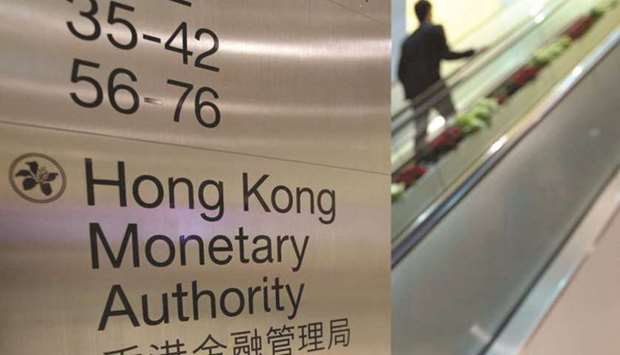While abundant liquidity has allowed banks to keep borrowing costs down, the city’s monetary authority is under pressure to tighten conditions as Hong Kong’s pegged currency slides towards the weak end of a trading band. New Federal Reserve chairman Jerome Powell is signalling the possibility of four rate hikes this year, which would stretch the yield gap between Hong Kong and the US even further. Slumping equities risk ending months of inflows, with mainland investors starting to turn net sellers.
The last time the local dollar was near such levels in August, the Hong Kong Monetary Authority sold extra debt, pushing up rates and the currency. With the HKMA last announcing additional bill sales in September, traders are watching for the authorities’ next move.
“The market is now very sensitive to any actions by the HKMA or any significant deterioration in China’s economic outlook,” said Raymond Yeung, an economist at Australia & New Zealand Banking Group Ltd in Hong Kong. “If people lose confidence in emerging-market or Chinese equities, there could be capital outflow.”
The Asian financial hub’s monetary policy hardly appears to be tied to the US, even though the currency peg means rates will eventually have to converge. The divergence has prompted traders to borrow the Hong Kong dollar to buy the greenback. The city’s currency fell as low as HK$7.8298 on Wednesday, close to the weak end of its 7.75-7.85 band.
“Their comfort zone may have been pushed to HK$7.84, based on their rhetoric,” said Frances Cheung, head of Asia macro strategy at Westpac Banking Corp in Singapore. “Regardless, there is a higher flexibility in terms of policy options before the weak-side convertibility is triggered, which is desirable. Exchange Fund Bills can be used to withdraw liquidity, with strong bills demand.”
The HKMA said Wednesday the exchange rate is weakening on expectations of faster US rate hikes and a widening spread. Rates will rise when the Hong Kong dollar reaches the weak end of its band, which shouldn’t cause any particular concern, the authority said.
Initial public offerings may also push up local rates this year, like they briefly did in 2017. According to Morgan Stanley, up to $30.5bn could be raised in IPOs in 2018, which may tighten liquidity. Meanwhile, credit demand has grown in the city, with the loan-to-deposit ratio rising to 83% in December, the highest since March 2015, HKMA data show.
This bout of Hong Kong dollar weakness isn’t worrying the market so far. Unlike January 2016, when the currency was around these levels, 12-month forwards are now near the strong end of the band. In the options market, the value of outstanding contracts with strike prices weaker than HK$7.85 has dropped to the lowest since at least November 2016, according to month-end figures. -With assistance from Stephen Spratt and Michael Patterson.

